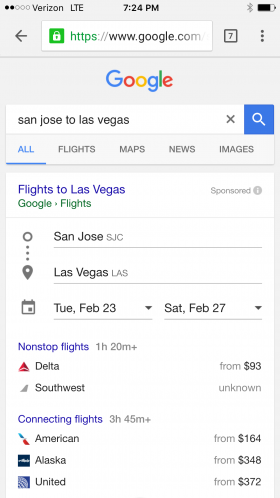Updated January 12, 2023
Reading Time: 3 minutes
Will Travel Websites Take a Hit in SERP?
Whether they want to buy, go, do, or learn, more people are reliant upon their mobile devices to get the information that they need in the moment. Google calls these Micro Moments. Aimed at making the experience more convenient and relevant, users are seeing a dramatic change to mobile travel search results. Love it or hate it, this latest Google change may displace travel websites in the SERP.
48% Growth in Mobile Search
One of the ways that Google has responded to the new consumer journey is by changing the way mobile travel results appear on the search engine results page (SERP). In a past year, mobile travel visits have grown by 48%. As a result, Google wants to make the mobile user experience specifically related to travel easier and more visually pleasant. These changes have affected the way travel-related businesses reach their customers on the web. And not in a good way.
Google Gives Mobile Travel Search Results a Face-Lift
The results that users see when searching for travel-related keywords on mobile will now look a little different. When you type in a search phrase, Google offers a couple of destinations with the option to expand the results. Once you have done this, there is no way to get back to web search results without clicking the back button or searching again.
After clicking on the destination, the user sees a visually-appealing mobile knowledge graph card, but the button to return to the web results is hidden at the bottom of the page. Though this may create a better experience for the mobile searcher, as Search Engine Land notes, this change in mobile travel search results may create challenges for brands optimizing for travel search.
Travel Website Optimization Implications
Google’s change in the mobile travel search results will make it harder for travel-related websites to get the visibility they want on Google. As you can see from this screenshot, consumers can easily compare pricing. Travel brands, including aggregators like Travelzoo, need to pay close attention to analytics and the search console in order to monitor how their site is appearing in organic search. If your company is losing visibility on Google or web traffic starts to slow, it may be time to adjust your marketing strategy to compensate for this change.
Optimizing a site to take advantage of longer-tail keywords is one strategy. More specific keyword phrases can help you better communicate with customers who are looking for the services your brand provides. Consider adding online advertising to the marketing mix may also be required to close the traffic gap caused by the mobile travel search algo change. Targeted digital ads can help you boost visibility by reaching out to customers who are most likely to buy. Lastly, don’t discount the value of brand loyalty. Customers who belong to loyalty programs (e.g., frequent flyers) will continue to seek out their favorites.
Have you noticed this mobile search change? Do you find it useful?


 Can-Spam Act Compliance Considerations
Can-Spam Act Compliance Considerations